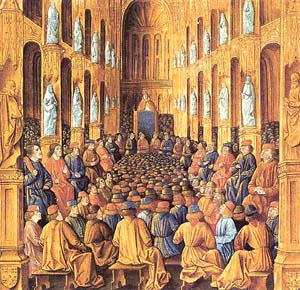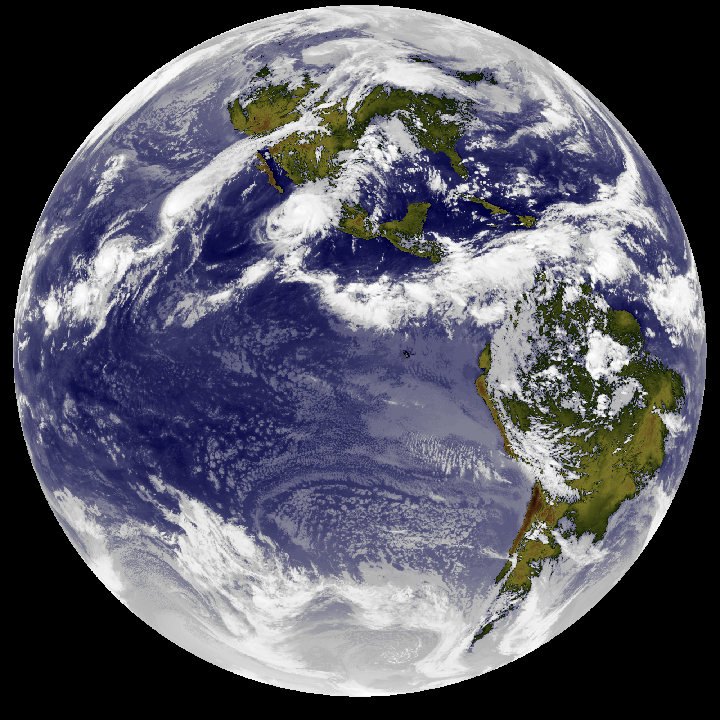
November 18

1095 Pope Urban II opens the Council of Clermont, attended by over 200 bishops. Summoned to plan the First Crusade, the Council decrees that a pilgrimage to Jerusalem makes every other penance superfluous.

1302 Pope Boniface VIII publishes the bull Unam Sanctam. It is the first papal writing to decree that spiritual power takes precedent over temporal power, and that subjection to the pope is necessary to salvation.
1421 The Zuider Zee floods 72 villages, killing an estimated 10,000 in the Netherlanders.
1477 William Caxton produces the first printed book in the English language to carry a date, The Dictes and Sayengis of the Phylosophers; a translation from the French book by Earl Rivers.

1626 The newly completed St. Peter's Basilica is dedicated in Rome by Urban VIII. St. Peter's is presently the largest church in Christendom, with a length of 619 feet. (Bradley)
1755 The worst earthquake ever recorded in the Massachusetts Bay area strikes Boston. No deaths are reported.


1803 Battle of Vertieres: Haiti's revolutionary army of freed slaves is victorious over the French.
1805 Thirty women meet at Mrs Silas Lee's home in Wiscasset, Maine, and organize the first woman's club in America: The Female Charitable Society.


1832 Birth: Nils Adolf Erik Nordenskjold, in Sweden, Arctic explorer.
1861 US Civil War: The first provisional meeting of the Confederate Congress is held in Richmond, Virginia.
1865 Mark Twain's short tale, The Celebrated Jumping Frog of Calaveras County, is first published on this date in The New York Saturday Press. The short story's publication launches Twain's success as a writer.

![]()
1883 At exactly noon, American and Canadian railroads begin using four continental time zones to end the confusion of dealing with thousands of local times. The bold move is emblematic of the power shared by the railroad companies. The need for continental time zones stems directly from the problems of moving passengers and freight over the thousands of miles of rail line that cover North America by the 1880s. Since human beings had first begun keeping track of time, they set their clocks to the local movement of the sun. Even as late as the 1880s, most towns in the US had their own local time, generally based on 'high noon,' or the time when the sun was at its highest point in the sky. As railroads began to shrink the travel time between cities from days or months to mere hours, however, these local times became a scheduling nightmare. Railroad timetables in major cities listed dozens of different arrival and departure times for the same train, each linked to a different local time zone. Efficient rail transportation demanded a more uniform timekeeping system. Rather than turning to the federal governments of the United States and Canada to create a North American system of time zones, the powerful railroad companies took it upon themselves to create a new time code system. The companies agreed to divide the continent into four time zones; the dividing lines adopted were very close to the ones used today. Most Americans and Canadians will quickly embrace their new time zones, since railroads are often their lifeblood and main link with the rest of the world. However, it is not until 1918 that Congress will officially adopt the railroad time zones and put them under the supervision of the Interstate Commerce Commission. (Bradley)

1894 The New York World publishes the first regular Sunday comic section.

1901 Birth: George Gallup, in Jefferson, Iowa, statistician, influential public opinion analyst. Note: Yes, the latter four word phrase 'should' be a contradiction in terms.
1903 Hay-Bunau-Varilla Treaty: The second Hay-Pauncefote Treaty is signed. The United States is given extensive rights by Britain for building and operating a canal through Central America.
1905 Prince Charles of Denmark is elected first king of Norway after the restoration of its independence, taking the old Norse name of Haakon VII.
1906 Anarchists bomb St. Peter's Basilica in Rome.

1909 The US invades Nicaragua.
1912 Albania declares independence from Turkey.
1912 Cholera broke out in Constantinople.
1916 WW1: General Douglas Haig halts the first Battle of the Somme in Europe after five months of futile battle, which included the first use of tanks in battle. The Allied advance of just 125 square miles claims 420,000 British and 195,000 French casualties. German losses are over 650,000.

1918 The Latvian National Council proclaims the independent Republic of Latvia, with Janis Cakste as president.

1919 The visiting Prince of Wales receives a New York City ticker tape parade.
1921 New York City considers varying work hours to avoid long traffic jams.
1923 Birth: Alan B. Shepard, Jr., in East Derry, New Hampshire, Rear Admiral USN, astronaut, first American astronaut in space, (Mercury 3, Apollo 14).
1928 After much resistance from movie distributors, Walt Disney arranges for the premier viewing of his first Mickey Mouse cartoon with sound. Titled Steamboat Willie, it debuts at the Manhattan's Colony Theatre. It is the first cartoon with a fully synchronized sound track; a major breakthrough for the animation industry.
1929 A large earthquake in the Atlantic breaks the transatlantic cable in 28 places.
1935 Economic sanctions imposed on Italy by the League of Nations for its invasion of Abyssinia (Ethiopia) take effect.

1937 Church and Reich: A catholic official refuses to allow permission for the Ministry of Ecclesiastical Affairs to consult diocesan files on Jewish conversions and mixed marriages "on grounds of pastoral secrecy." Note: Up to this time, the Church had closely cooperated with the government in determining and sorting out those of Jewish descent. It was only when Catholics of Jewish descent were threatened that the Catholic church balked. Yet, even then, they continued disclosing the names of non-Catholics of Jewish extraction right through the war years, when the price of being Jewish was deportation and death. (Lewy)
1938 The US State Department extends visitor's visas to some 15,000 mostly Jewish refugees already in America, because of Kristallnacht.
1938 The Legislative Assembly of the American Virgin Islands adopts a resolution offering the islands as a haven for Jewish refugees. (Edelheit)
1938 Members of the Iron Guard (Legionaries) blows up the Ereschitza synagogue in Romania.
1939 The Irish Republican Army explodes three bombs in Picadilly Circus.
1941 WW2: Britain opens its second Western Desert offensive in Libya when the Eighth Army advances into Cyrenaica; code-named Operation Crusader.
1941 Holocaust: Rosenberg tells German journalists at a confidential briefing that the "Final Solution" has begun; a "biological extermination of all Jews in Europe." No Jew could remain on the continent to the Ural Mountains; they would either be forced beyond the Urals or exterminated. The press was not to write about the extermination in detail, but the reporters could use stock phrases such as the "definite solution" or the "total solution of the Jewish question." (NA RG 242, T-77/R 1175/433; Architect)
1942 Holocaust: The Gestapo murders 200 Poles in a prison in Kazimierz Dolny.

1943 Ray Atherton is nominated to be the first US ambassador to Canada.
1945 Dr. W. N. Leek of Cheshire declares that Britain's falling birthrate is due to the use of pajamas.
1945 The communist-led Fatherland Front wins the Bulgarian general election after opposition parties abstain.
1948 Alben W. Barkley weds Elizabeth J. Rucker in St. Louis: The first time a US Vice President marries while in office.

1950 The US Bureau of Mines discloses its first production of oil from coal in practical amounts.
1958 The first true reservoir in Jerusalem opens.
1960 The US copyright office issues its 10 millionth registration.
1961 NASA attempts launching Ranger 2 to the Moon.
1962 Death: Niels Bohr, physicist who won the Nobel Prize in 1922.
1963 America's Bell Telephone company introduces push-button telephones for the first time. Touch-tone service is available as an option for an extra charge.

1966 This is the last required meatless Friday for American Roman Catholics, in accordance with a decree made by Pope Paul VI earlier this year.

1969 Death: Joseph P. Kennedy, financier, diplomat, in Hyannis Port, Massachusetts, at the age of 81.
1970 Nobel Prizewinner Linus Pauling declares that large doses of Vitamin C can ward off the common cold.
1970 West Germany and Poland initial a treaty recognizing the Oder-Neisse line as a common border and pledging each other to territorial integrity.
1976 Spain's parliament approves a bill to establish a democracy after 37 years of dictatorship.
1983 Argentina announces its ability to produce enriched uranium for nuclear weapons.
1984 The Soviet Union helps deliver American wheat during the Ethiopian famine.
1987 The congressional Iran-Contra committee issues their final report, saying President Reagan bears 'ultimate responsibility' for wrongdoing by his aides.
1988 President Reagan signs legislation creating a Cabinet-level drug czar and providing the death penalty for drug traffickers who kill.
1990 Desert Shield: Iraq's Saddam offers to free an estimated 2,000 men held in Kuwait.
1991 British peace envoy Terry Waite and US academic Thomas Sutherland are released from five years of captivity in Lebanon by the Lebanese Shiite Moslem faction of the Islamic Jihad.
1992 Police arrest Pakistani opposition leader Benazir Bhutto when she tries to lead a march on parliament to demand the government's removal.
1993 Black and white leaders in South Africa approve the new democracy constitution, which gives blacks the right to vote and ends white minority rule.
1993 Ukraine's parliament overwhelmingly ratifies the START-1 disarmament treaty but places stiff conditions on giving up nuclear weapons on its territory.
1994 Palestinian police open fire on Islamic militants outside a mosque in the Gaza Strip, sparking riots that kill at least 14 people and injure 200.
1995 The Vatican declares that, unlike meatless Fridays, the Roman Catholic ban on the ordination of women as priests is a definitive, infallible and unquestionable part of the Church's doctrine.
1997 Five suspected agents for Libya go on trial in Berlin for the 1996 bombing of a nightclub that killed three people.
1997 The FBI officially pull out of the probe into the TWA Flight 800 disaster, saying the explosion that destroyed the Boeing 747, killing all 230 people aboard, was not caused by a criminal act.
1998 House Republicans endorse Louisiana Representative Bob Livingston to succeed Newt Gingrich as House speaker.




2001

2002

2002

2003

2003

2004

2004

2004

2004

2004

2004

2004

2004

Visit:




 Visit:
Visit:

Click Here to email the History: One Day At a Time webmaster.